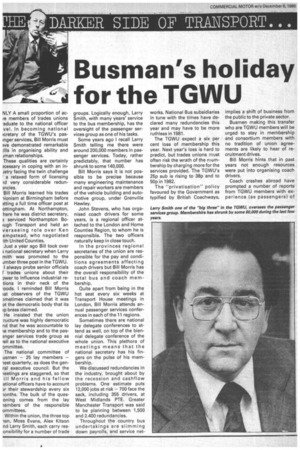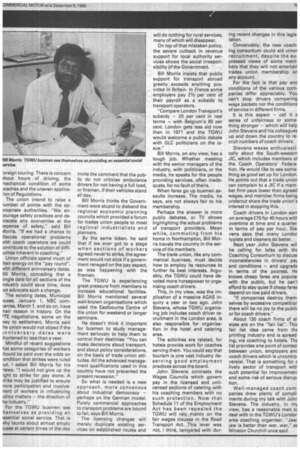Busman's holiday for the TGWU
Page 80

Page 81

If you've noticed an error in this article please click here to report it so we can fix it.
NLY A small proportion of ac/e members of trades unions .aduate to the national officer vel. In becoming national icretary of the TGWU's pas:tiger services, Bill Morris must we demonstrated remarkable :ills in organising ability and Jrnan relationships.
These qualities are certainly ;cessary in coping with an inistry facing the twin challenge a relaxed form of licensing Id very considerable redunmcies.
Bill Morris learned his trades lionism at Birmingham before atting a full time officer post at ottingham, At Northampton, here he was district secretary, 3 serviced Northampton Bo
■ ugh Transport and held an verseeing role over Ken empstead, who negotiated ith United Counties.
Just a year ago Bill took over ;national secretary when Larry mith was promoted to the J mber three post in the TGWU. I always probe senior officials F trades unions about their Dwe r to influence industrial retions in their neck of the pods. I reminded Bill Morris at observers of the TGWU Dmetimes claimed that it was ot the democratic body that its )p brass claimed.
He insisted that the union :ructure was highly democratic nd that he was accountable to le membership and to the pasanger services trade group as rell as to the national executive Dmmittee.
The national committee of usmen — 25 lay members — )eet quarterly, as does the genral executive council. But the leetings are staggered, so that ill Morris and his fellow ational officers have to account )r their stewardship every six ionths. The bulk of the quesoning comes from the lay lembers of the responsible ommittees.
Within the union, the three top len, Moss Evans, Alex Kitson nd Larry Smith, each carry resonsibility for a number of trade groups. Logically enough, Larry Smith, with many years' service to the bus membership, has the oversight of the passenger services group as one of his tasks.
Some years ago I recall Larry Smith telling me there were around 200,000 members in passenger services. Today, rather predictably, that number has shrunk to some 140,000.
Bill Morris says it is not possible to be precise because many engineering maintenance and repair workers are members of the vehicle building and automotive group, under Grenville Hawley.
John Stevens, who has organised coach drivers for some years, is a regional officer attached to the London and Home Counties Region, to whom he is responsible. The two officers naturally keep in close touch.
In the provinces regional secretaries of the union are responsible for the pay and conditions agreements affecting coach drivers but Bill Morris has the overall responsibility of the total bus and coach membership.
Quite apart from being in the hot seat every six weeks at Transport House meetings in London, Bill Morris attends annual passenger services conferences in each of the 11 regions.
Sometimes there are national lay delegate conferences to attend as well, on top of the biennial delegate conference of the whole union. This plethora of meetings means that the national secretary has his fingers on the pulse of his membership.
We discussed redundancies in the industry, brought about by the recession and cashflow problems. One estimate puts 12,000 jobs at risk — 700 face the sack, including 355 drivers, at West Midlands PTE. Greater Manchester Transport was said to be planning between 1,500 and 2.400 redundancies.
Throughout the country bus undertakings are slimming down payrolls, and service net
works. National Bus subsidiaries in tune with the times have declared many redundancies this year and may have to be more ruthless in 1981.
The TGWU expect a six per cent loss of membership this year. Next year's loss is hard to predict, but trades unions must often risk the wrath of the niumbership by charging more for the services provided. The TGWU's 25p sub is rising to 38p and to 50p in 1982.
The "privatisation" policy favoured by the Government as typified by British Coachways, implies a shift of business from the public to the private sector.
Busmen making this transfer who are TGWU members will be urged to stay in membership and consortium members with no tradition of union agreements are likely to hear of recruitment drives.
Bill Morris hints that in past years not enough resources were put into organising coach drivers.
Coach crashes abroad have prompted a number of reports from TGWU members with experience (as passengers) of 'oreign touring. There is concern 3bout hours of driving, the nechanical condition of some ;oaches and the uneven applicaion of Regulations.
The union intend to raise a -lumber of points with the ap)ropriate authorities. "We en;ourage safety practices and de)recate any economies at the 3xpense of safety,' said Bill Vlorris. "If we had a chance to liscuss operational problems vith coach operators we could ;ontribute to the solution of diffi;ulties inherent in coaching."
Union officials spend much of heir energy on the "pay round", vith different anniversary dates. 3111 Morris, conceding that a ringle date for all sections of the ndustrij could save time, does lot advocate such a change.
The existing dates, Municipal ,uses, January 1, NBC corn3anies, March 1, and so on, have heir reason in history. On the 'TE negotiations, some on the vay to settlement, Morris said he union would not object if the inniversary dates were ;hortened to less than a year.
Mindful of recent suggestions hat some categories of workers :hould be paid over the odds on :ondition that strikes were ruled nit, I asked Bill Morris for his ,iews. "I would not give up the ight to strike for pay alone. A .trike may be justified to ensure nore participation and involvenent of workers in influencing iolicy matters — the direction of he industry."
For the TGWU busmen see hemselves as providing an issentiai social service. That is vhy taunts about almost empty iuses at certain times of the day invite the comment that the public do not criticise ambulance drivers for not having a full load, or firemen, if their vehicles stand all day.
Bill Morris thinks the Government were stupid to disband the regional economic planning councils which provided a forum for trades union people to meet regional industrialists and planners.
By the same token, he said that if we ever got to a stage when sections of workers agreed never to strike, the agreement would not stick if a government reneged on the pay aspect, as was happening with the firemen.
The TGWU is experiencing great pressure from members to increase educational facilities. Bill Morris mentioned several well-known organisations which used the Eastbourne Centre of the union for weekend or longer seminars.
He doesn't think it important for busmen to study management seriously to help them to control their destinies. "You can make decisions about transport, and about policy considerations, on the basis of trade union attitudes. All the advanced management qualifications used in this country have not prevented the present recession."
So what is needed is a new approach, more concensus about industrial democracy — perhaps on the German model. Purely commercial approaches to transport problems are bound to fail, says Bill Morris.
The licensing changes will merely duplicate existing services on established routes and will do nothing for rural services, many of which will disappear.
On top of that mistaken policy, the severe cutback in revenue support for local authority services shows the social irresponsibility of the Government.
Bill Morris insists that public support for transport abroad greatly exceeds anything provided in Britain. In France some employers pay 21/2 per cent of their payroll as a subsidy to transport operators.
"Compare London Transport's subsidy — 20 per cent in real terms — with Belgium's 80 per cent. London gets less aid now than in 1971 and the TGWU would welcome a public debate with GLC politicians on the issue."
Bill Morris, on any view, has a tough job. Whether meeting with the senior managers of the industry, with politicians, or the media, he speaks for the people providing services, often inadequate, for no fault of theirs.
When fares go up busmen assaults increase. The media, he says, are not always fair to his membership.
Perhaps the answer is more public debates, or TV shows highlighting the actual problems of transport providers. Mean while, commuting from his home in Northampton, Bill Morris travels the country in the service of his members.
The trade union, like any commercial business, must decide how to employ its resources to further its best interests. Arguably, the TGWU could have devoted more horsepower to organising coach drivers.
This, in my view, was the implication of a massive ACAS inquiry a year or two ago. John Stevens, whose TGWU organising job includes coach driver recruitment in the London area, is also responsible for organisation in the hotel and catering area.
The activities are related, for hotels provide work for coaches serving them. You could say that tourism is one vast industry deserving good employment practices across the board.
John Stevens contrasts the Wages Councils which govern pay in the licensed and unlicensed sections of catering with his coaching members with no such protection. Now that Schedule 11 of the Employment Act has been repealed the TGWU will rely mainly on the fair wages clauses in the Road Transport Act. This lever was not, I think, tampered with dur
ing recent changes in this legislation.
Conceivably, the new coaching consortium could aid union recruitment, despite the expressed views of some members that they will not entertain trades union membership on any account.
For the fact is that pay and conditions of the various companies differ appreciably. You can't stop drivers comparing wage packets nor the conditions of service in different firms.
It is this aspect — call it a sense of unfairness or something stronger — which will help John Stevens and his colleagues up and down the country to recruit numbers of coach drivers.
Stevens waxes enthusiastically about the South-western JIC, which includes members al the Coach Operators' Federation. He would like to see something as good set up for London. He points out that a trade union can complain to a JIC if a member firm pays lower than agreed wages, and member firms being undercut share the trade union's interest in stopping this.
Coach drivers in London earr on average £70 for 45 hours with overtime at time and a quarter In terms of pay per hour, Ste. vens says that many Londor typists and cleaners do better.
Next year John Stevens wil be calling for talks with thE Coaching Consortium to discuss inconsistencies in drivers' pay and conditions — and upgrade in terms of the poorest. HE knows cheap fares are popular with the public, but he can't afford to stay quiet if cheap fares depend on low paid drivers.
"If companies destroy them. selves by excessive competitior there will be no joy to the public or for coach drivers."
About 130 coach firms of al sizes are on the "fair list". This fair list idea came from thE printing industry and is spread. ing, via coaching to hotels. ThE list provides one point of contact between union, employers anc coach drivers which is uncontro. versial. That is something for E lively sector of transport with such potential for improvement and some risk of serious disruption.
Well-managed coach corn• panies drew plenty of compli• ments during my talk with Johr Stevens. The industry, in my view, has a reasonable man tc deal with in the TGWU's Londor area coaching organiser. "Jaw, jaw is better than war, war," as Winston Churchill once said.












































































































































